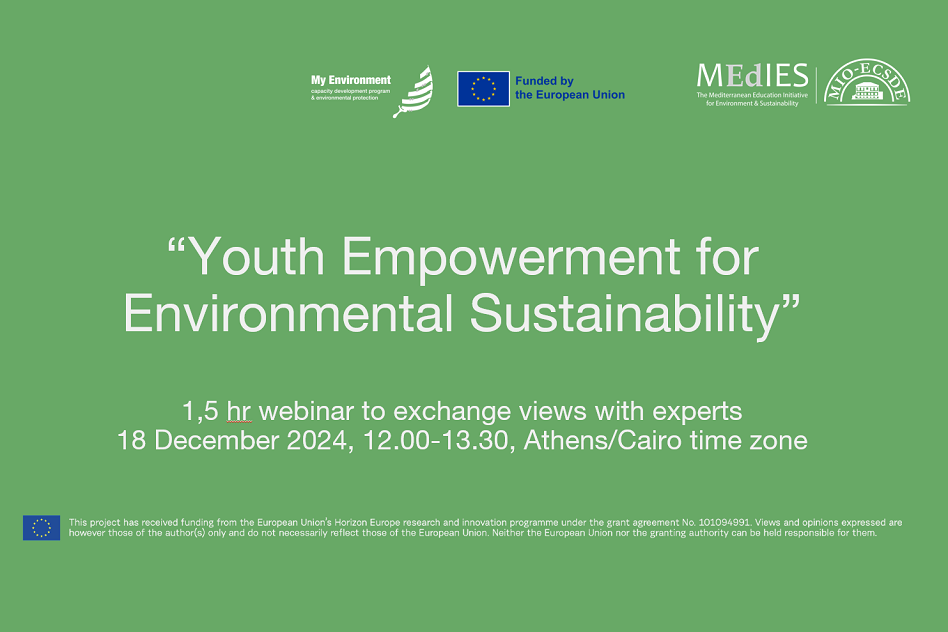Half way through the Be2aty project, aiming to empower Egyptian youth in addressing local environmental challenges through practical projects, we took the opportunity to pause and reflect. Together with three experts from Egypt and abroad we explored on the lessons we have learned and examined the challenges we have encountered while collaborating with youth to develop implementable solutions for pressing local environmental issues .
What: A 1.5 hr expert discussion on Youth Empowerment in the Sustainability Sector
When: 18 December 2024, 12.00-13.30, Athens-Cairo time zone, UTC +2
Who: About 25 individuals took part, mostly youth or engaged with young people.
Our Panelists:
– Ann Finlayson, CEO and Learning for Sustainability Lead, SEEd (UK)
Ann has worked in the environmental and education field for over 30 years. After a stint as a countryside ranger in Scotland, she began travelling the world teaching, facilitating and consulting in places such as Papua New Guinea, Australia and Canada. Having been head of education in WWF-UK and Commissioner for Education in the UK’s Sustainable Development Commission, Ann is passionate about the role of learning in sustainability and for it to be about real people, real opportunities and real responsibilities. Read more
– Stella Saratsi, Goethe-Instute, Athens (Greece)
Stella is a resourceful professional, with a proven record in developing and delivering a wide range of programs and interventions, aiming at the empowerment of individuals, groups and organizations. Having worked for many years in the broader field of Civil Society Organizations, in Greece and abroad, she has the sole aim to foster through community-based action, training courses, and effective project management a higher quality of life for individuals from marginalized and underrepresented communities. She is currently coordinating the ERASMUS+ project LOCALY, at Goethe-Institut Athen. Linkedin
– Lamiaa Serag El-Din Alwan-wa-Awtar (Egypt)
Lamiaa is a Monitoring and Evaluation specialist, based in Cairo. She has over 8 years of facilitation experience in the field of non-formal education, and over 9 years of volunteer and professional experience in the field of skill development for employment. Lamiaa firmly believes that Arts and Culture help people grow into more wholesome, and more human versions of themselves. Linkedin
Watch the video recording:
Summary
Answering to the first question: “What does meaningful youth engagement in sustainability look like”, panelists emphasized the importance of authenticity and trust when working with young people, highlighting the need to address their specific contexts and lived realities. Effective engagement begins by acknowledging the existing generation gap, recognizing youths’ skills and interests and also their existential fears, rather than treating them as passive knowledge recipients or tabula rasa. Empowering youth involves encouraging critical thinking, self-directed and self-reflective learning, and facilitating their connection to real-world challenges, so that can eventually articulate their own questions about the world around them. Moreover, the sense of Agency, the feeling of a young person being competent to bring change was underlined. However, engagement should be tied with action and link with policy makers: As one panelist said, giving them a voice is simply not enough, when we don’t know what to do with this voice!
The second topic that was addressed revolved on overcoming the challenges of reaching and taking on-board the marginalized, or underrepresented youth, or those living in isolated rural communities. Admittedly as one panelist said “Life for many people can look very different to what we have in mind” and to address this we should seriously invest time and effort in mapping and understanding where these people are, in order for us to meet them where they are. In order to be pro-active, people need to not feel stressed about money, or how to feel their family. Practical strategies like forming partnerships with trusted local organizations and addressing logistical barriers (e.g., transportation or costs) were recommended.
In the third part of the discussion the panelists reflected on ways of sustaining engagement beyond short-term projects. A key takeaway was the importance of long-term, funding models and flexibility in allocating the available resources. Genuine inclusion means inviting young people from the start and not as an add-on to co-design initiatives and ensuring that their voices can influence decisions. Sustainability challenges are social challenges, that require a massive social change. And apparently metrics exist in measuring how change happens in young people, that are however different from the metrics that funders apply. Change in young people happens when they design their own project, they are helped in understanding their own learning, they shown that what they are doing is valid and they have an insight to the “system” they are operating and start noticing the gaps but also the leverage points for potential action. The personal drive and self-advocacy (the skill of young people to represent themselves and tell their own stories), as well the sense of Agency (feeling “I m not small, I m not alone, I can do this”) was underlined.
Overall, the session highlighted that true progress requires shifting the emphasis from imposing agendas to listening, being flexible, and co-creating with young people, while learning ourselves, together with them.
Resources
Read more on the social change models that were mentioned in our discussion:
SEEd Young Change Makers Program: https://se-ed.org.uk/our-work/seed-young-changemakers/
The Localy Project – Local Capacity and Awareness of Life for Youth: https://www.localyproject.eu/
